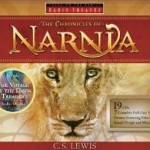Carrie Brownell,
Reading to Know Blog,
Corvallis,
 I’m reading Voyage alongside the Book of Proverbs because as I was reading this story I began to see all sorts of lessons that can be tied up into the wisdom book of scripture.
I’m reading Voyage alongside the Book of Proverbs because as I was reading this story I began to see all sorts of lessons that can be tied up into the wisdom book of scripture.
A lot of the Proverbs that initially jumped out at me were ones that discussed relationship issues between the characters, and I find easy application to my own life among them.
To get started, one point that jumps out at me right off the bat happens during a discussion between Eustace, Edmund and Lucy. Eustace, if you aren’t familiar with him, is Edmund and Lucy’s cousin and pokes fun at their ‘Narnia talk.’ Eustace rejects the idea of Narnia, and pokes fun at his cousins with a “clever” little limerick. Lucy hears what Eustace is saying and attempts to engage with him over it, and wants to offer some “reasoned” argument to his obnoxious claims.
Which is frequently the way of the fool. Raise your hand if you are a Christian and you’ve been teased about some aspect of your faith. You probably don’t have to think very hard to remember such a time. If you believe in God, then no doubt you’ve come up against someone who has waggled their eyebrows at you in some form or fashion because of either the things you believe or the way you act out your belief system
Here we see Lucy – for many reasons wanting to reach out and try to reason with Eustace. Edmund’s insight into the situation causes him to realize that there is no talking about it at the moment. In fact, Edmund is right. Edmund tells him not to be a fool. Eustace offers proof both with words and actions that he is, indeed, the fool. Narnia exists and it will come to him. It is happening whether he likes it or not!
Proverbs 26:1-12 is all about fools so I started by reading these verses. 26:4 states that, in general, it is foolish to engage in dialogue with fools. However 26:5 affirms that on some occasions a fool’s words are so dangerous that they must be answered and refuted or else he (and any others listening to him) will think that he has presented the truth. The same apparent contradiction exists in proverbs in the English language. Compare for example, “look before you leap” and “he who hesitates is lost.” Each truism must be applied to the right situation.
In general I don’t feel like a fool deserves a “logical, reasoned”, etc. conversation. However, when something is presented as a truth that is dangerous for an individual or a group of individuals to believe, then I do believe that fact must meet fiction. In the case from Voyage above, Edmund recognized that it was useless to engage with Eustace over the existence of Narnia. The taunting and the teasing were something that Lucy and Edmund were called to bear. However, when Eustace tried to grasp hold of something and destroy it, Edmund stepped in. Truth collided with disbelief. Eustace cannot then argue with wet water.
Eustance lacks discernment. He rails against the truth that he is surrounded by! He foolishly declares his own righteousness on board Aslan’s ship and in the midst of an Aslan-appointed approved mission. So when he is given truth to heal him, all it does it make him more sick.
“But the natural man does not receive the things of the Spirit of God, for they are foolishness to him; nor can he know them because they are spiritually discerned.” (1 Cor. 2:14)
“Because the carnal mind is enmity with God; for it is not subject to the law of God, nor can it be.” (Romans 8:7)
This is the state we find Eustace in. He makes fun of truth and is proclaimed a fool. He rejects truth and ends up being sent below deck to moan in agony over the rocking of the ship. He cannot comprehend truth and he despises it when it is served to him.
By contrast, Edmund and Lucy who have already committed to learning the ways of Aslan, drink the Narnian brew and feel better. It heals, restores, and invigorates them for the journey they find themselves committed to.
They are excited to be on this Voyage and to be back in Narnia. I have to say I am as equally glad as I can be – without actually being in Narnia for a physical fact.
This is a series of books worth reading many times over, all throughout life. I’m glad to have the yearly excuse to do so. It’s good for the soul.
Disclaimer: Articles featured on Oregon Report are the creation, responsibility and opinion of the authoring individual or organization which is featured at the top of every article.

